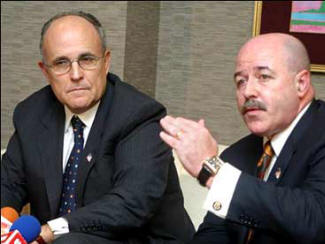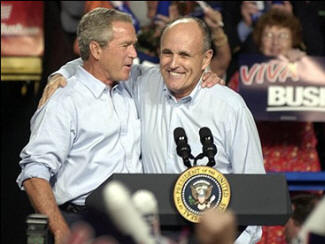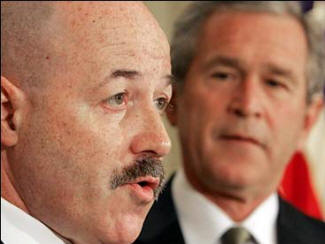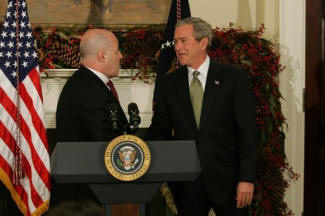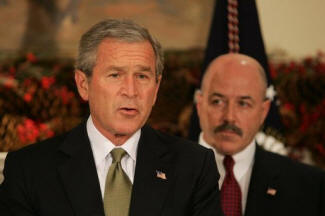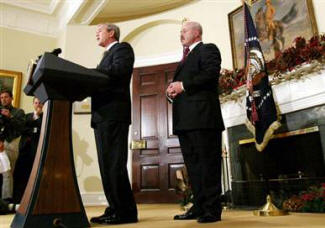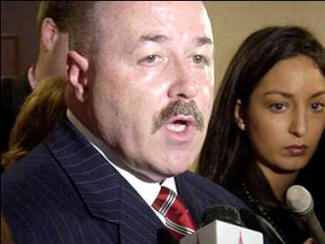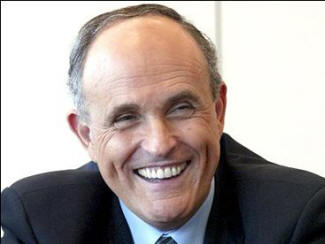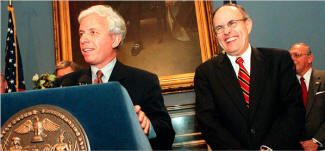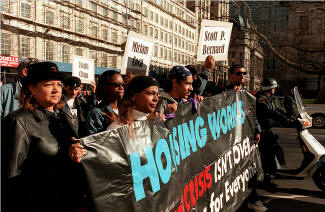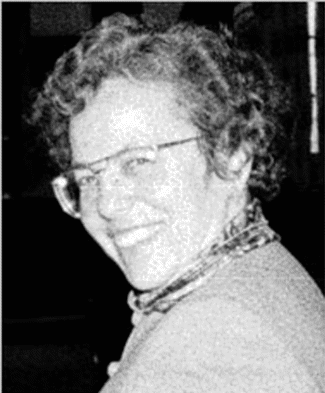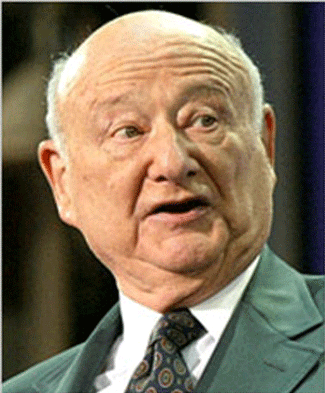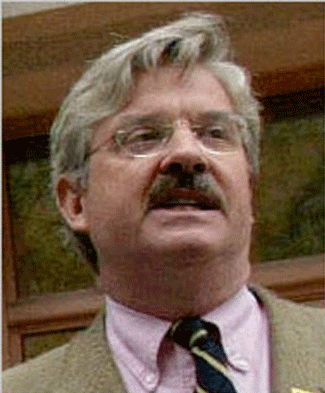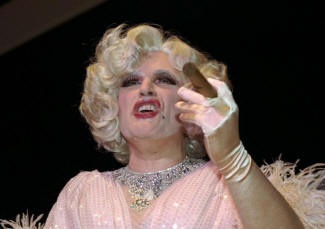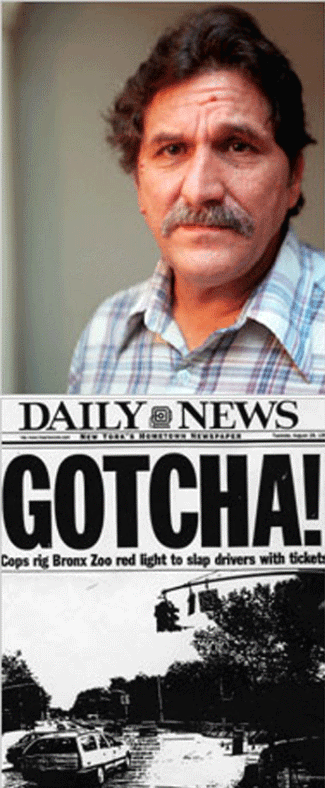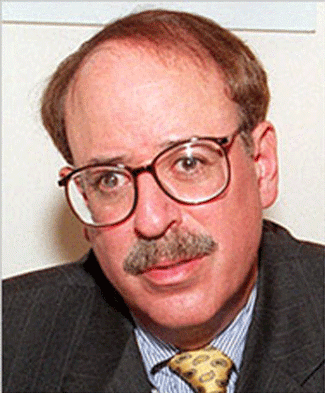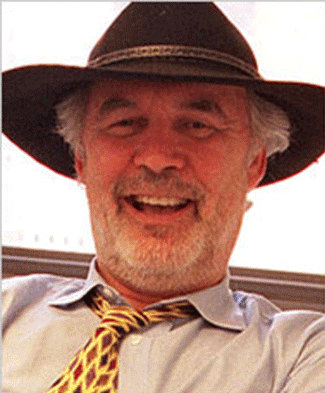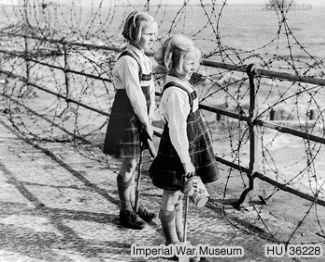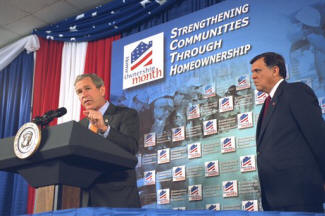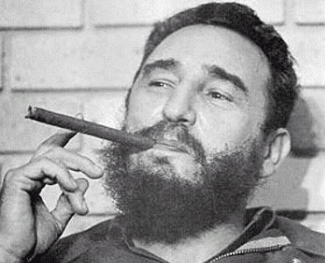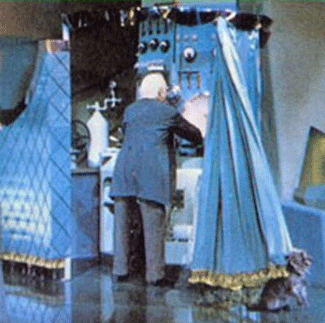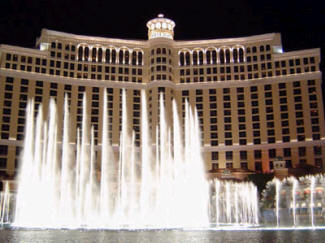KERIK, GIULIANI & BUSH -- LONGTIME PARTNERS IN CRIME, by Charles Carreon
04/29/07
On Why Both Giuliani and Bush Loved Bernard Kerik So Much
The Post-911 Star Couple
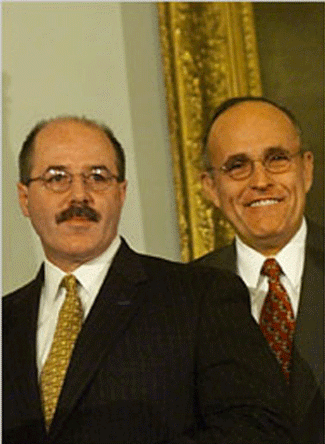
As the obviousness of the WTC attack being an inside job dawns on many people, they are trying to figure out the membership of the 911 Cabal. I figure we might as well start right there at Ground Zero. Let's ask a few questions:
Who attempted to cast himself as a heroic Police Commissioner, even though everything went wrong on his watch, from the moment the planes hit the Trade Center Towers?
Who failed to secure any evidence or procure a single prosecution for the largest single mass homicide in US history?
Who built a secret hideaway where he could boff New York City police employees in a boudoir overlooking Ground Zero?
Who lied about having organized crime redecorate that love-nest for free?
Who stood ready to take the office of the head of Homeland Security?
Who went off to found a partnership with former Mayor Giuliani, to provide "security consulting?"
Who profited from the sale of TASER stock after flogging the product to police chiefs all over the country?
Bernard Kerik did all these things. And he did all of it working in close association with Republican Presidential Candidate Rudolph Giuliani.
Giuliani's Partner and Loyal Bushie
Recently, I discovered a little detail about Kerik's charmed life as a Republican Sleazoid -- aka, a "Bushie," according to Kyle Sampson, a guy who should know. I was reading about how the "Coalition Provisional Authority" in Iraq had turned into a summer camp for politically-correct Republicans, incapable of doing anything useful for Iraq, beyond promulgating inane, impractical policies. There, in the midst of the danger and privilege of the Green Zone, I spotted Kerik's bombastic profile, helping Bush inflate the Big Lie that we were rebuilding Iraq. So important was Kerik's work that on October 4, 2003, Bush told the nation in his morning radio address, that Iraqi police are "instructed by professionals like New York City's outstanding former police chief, Bernard Kerik." Talk about giving Iraq access to our nation's best people -- but what could he teach the Iraqis about graft and corruption that they didn't already know? Then again, maybe Bush didn't want to take any chances.
Painting Baghdad Red
Undoubtedly, Kerik reminisces fondly about the good old days in Baghdad. What did Kerik actually do in Iraq? At that time, Kerik was a partner at Giuliani-Kerik, LLC, that was collecting money from the Pentagon as a "security consultant. It turns out he spent his days sleeping, and his nights prowling around doing "raids" with "security forces" all night in Baghdad. Closely associated with organized crime in New York, Kerik decided to try his hand at hardassing organized crime in Baghdad, and formed a paramilitary unit for that purpose. Apparently, the crime scene wasn't all that promising, possibly because there's so much chaos in Baghdad even criminals can't get organized, because after a 90-day stint of kibitzing with other gun-toting tough guys, he blew the hell right out of town. Kerik's announcement was delivered completely without prior notice, at a meeting of local police chiefs in Baghdad's Convention Center. Explaining his behavior, Kerik said, "I did my own thing." One year later, Bush nominated Kerik to be Secretary of Homeland Security.
Flying Too Close To the Sun
Giuliani and Kerik -- what a star couple they were! How happy their association for so many years, until Bush, excited about the prospects for getting a genuine criminal to be the nation's top law enforcement officer, proposed a ménage a trois. Poor Kerik, who had the misfortune to catch the monarch's admiring gaze, drawing the dreaded Media Eye to focus on him, inciting reporters to dig until they found damning shit. Then the worm Giuliani had kept under wraps in the Big Rotten Apple crawled out and smiled. It was that darned old Italian Mafia, up to its corrupting ways again, and Kerik, who'd risen from being Giuliani's driver to having a ringside seat at 911, came plummeting down from the skies, another fat Icarus who flew too close to the sun. Surprisingly, it was one of those scandals that somehow passed most people by, as if they couldn't understand why having a criminal as the nation's head of security would be a bad idea. Then again, you can't blame people who watch TV too much. When Kerik said he was withdrawing his candidacy for the job because he'd failed to pay taxes on his immigrant nanny, there were actually news outlets that gave this story a full run, without sniggering. Soon thereafter, Giuliani kicked Kerik out of their security company, Giuliani & Kerik, LLC. Bush never said a bad word about Kerik, and didn't even try to explain how with all the spying on American citizens, his people couldn't even vet a resume for a Cabinet-level position. The "Decider" just turned away from the spectacle and let shit roll downhill.
The Henhouse Is Secure In Enemy Hands
It is often said of the Republicans that they are loyal. Being loyal to other gangsters is not a virtue. When we rate Bush and Giuliani, we must remember that they jointly endorsed Kerik as a candidate for Head of Homeland Security, and both overlooked Kerik's mob connections even as they sought to elevate him to the position of the nation's Top Cop. Giuliani had a hard time convincing a New York prosecutor that he really didn't know about Kerik's cozy friendships with the Gambino Crime Family. Why? For the same reason that they put foxes in charges of the henhouse everywhere -- to do PR and eat fried chicken!
Heroes of The Big Lie
Kerik is an aggressive bullshitter, the type of guy Bush and Giuliani rely on to get things done. Or rather, to get nothing done, when it comes to investigating 911, or rebuilding Iraq. If you think Kerik failed to do his job through incompetence, you misunderstand him, and Giuliani, and Bush. You would make a poor Republican. Kerik was a good Bushie because he remembered he was working for Bush at all times. It was his job to prop up fairy stories, to feed the public a flow of comforting tough-guy attitude. Regarding 911, he did a hero act that distracted people from pursuing any real investigation. Regarding Baghdad policing, he supplied phony evidence that security was getting a jumpstart in Iraq.
Let's Give This Man A Comeback!
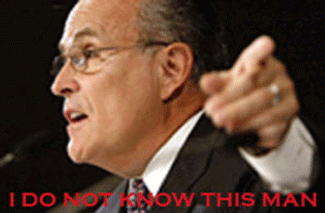
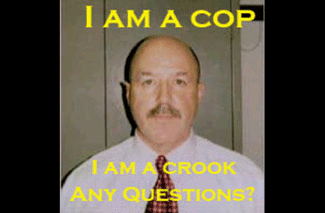
Kerik performed well, like Mike Chertoff, who ended up running Homeland Security and let New Orleans drown first and rot later, another Giuliani protege who received a warm welcome at the White House. Remember, Chertoff will still be there when Bush walks out, either due to impeachment or under his own power, ready for employment under the next President. Do you want four more years of Big Lies, patronage appointments, corruption and waste? You'll get them from Giuliani. And just imagine if Kerik, a loyal Bushie who has been unfairly convicted of crimes by the People of New York, scores a pardon from Bush. (Don't tell me Bernie won't ask!) Then Giuliani, put into office by a third Republican-rigged election, can bring Kerik back in from the cold, like Bush did to Admiral Poindexter, making him head of "Total Information Awareness." That would be comforting for fascists from Saudi Arabia to North Carolina, and might spark a boom in love-nest construction worldwide.
http://www.ragingblog.com
________________________________________
Rudy Says Bye, Bye Bernie
Kerik, Amidst Investigation, Resigns From Giuliani Partners
NEW YORK, Dec. 22, 2004
Former New York City police commissioner Bernard Kerik, right, gestures while he speaks with reporters as former New York City Mayor Rudolph Giuliani looks on in this Nov. 7, 2003 file photo. (AP Photo)
Rudy Giuliani, with President Bush at the Republican convention in New York, has apologized to the president for the scandal involving his close associate Bernard Kerik. (AP)
Kerik, left, speaks after President Bush nominated him for Homeland Security Secretary. (AP)
(CBS/AP) Bernard Kerik and Rudy Giuliani have parted ways, at least in business. Kerik resigned late Wednesday afternoon from Giuliani Partners, the former mayor's local consulting firm. Giuliani says he accepted the resignation reluctantly.
Kerik, the former police commissioner of New York City and one-time Bush Cabinet nominee said at a news conference that he had apologized to Giuliani for being a distraction because of his messy withdrawal as a candidate to head the Department of Homeland Security.
Kerik had been CEO of Giuliani-Kerik LLC, an affiliate of Giuliani Partners LLC. In a statement Wednesday, Giuliani said Giuliani-Kerik would be renamed Giuliani Security & Safety.
Kerik said he told Giuliani his resignation would be effective immediately. He said he would seek other unspecified business opportunities, and did not take questions from reporters.
President Bush tapped Kerik, 49, earlier this month as his nominee for homeland security secretary, but Kerik abruptly withdrew his name Dec. 10 after revealing that he had not paid all required taxes for a family nanny-housekeeper and that the woman may have been in the country illegally.
He has been hit with other allegations as well, including that he had connections with people suspected of doing business with the mob and that he had simultaneous extramarital affairs with two women.
Kerik's nomination became a political embarrassment for Giuliani, a rising star in the GOP who had recommended his friend and business partner to Mr. Bush.
After leaving the police department in 2002, Kerik joined Giuliani Partners, becoming a security consultant and then signing on to help launch the Iraqi police force.
Giuliani Partners has advised business and government agencies on security, leadership and other issues. The consulting firm advised Trinidad in its battle against a rise in kidnappings and murders and was paid $4.3 million by Mexico City officials for advice on reducing crime there.
©MMIV, CBS Broadcasting Inc. All Rights Reserved. This material may not be published, broadcast, rewritten, or redistributed. The Associated Press contributed to this report.
________________________________________
Ties to GOP Trumped Know-How Among Staff Sent to Rebuild Iraq
Early U.S. Missteps in the Green Zone
By Rajiv Chandrasekaran
Washington Post Staff Writer
Sunday, September 17, 2006; A01
Adapted from "Imperial Life in the Emerald City," by Rajiv Chandrasekaran, copyright Knopf 2006
After the fall of Saddam Hussein's government in April 2003, the opportunity to participate in the U.S.-led effort to reconstruct Iraq attracted all manner of Americans -- restless professionals, Arabic-speaking academics, development specialists and war-zone adventurers. But before they could go to Baghdad, they had to get past Jim O'Beirne's office in the Pentagon.
To pass muster with O'Beirne, a political appointee who screens prospective political appointees for Defense Department posts, applicants didn't need to be experts in the Middle East or in post-conflict reconstruction. What seemed most important was loyalty to the Bush administration.
O'Beirne's staff posed blunt questions to some candidates about domestic politics: Did you vote for George W. Bush in 2000? Do you support the way the president is fighting the war on terror? Two people who sought jobs with the U.S. occupation authority said they were even asked their views on Roe v. Wade.
Many of those chosen by O'Beirne's office to work for the Coalition Provisional Authority, which ran Iraq's government from April 2003 to June 2004, lacked vital skills and experience. A 24-year-old who had never worked in finance -- but had applied for a White House job -- was sent to reopen Baghdad's stock exchange. The daughter of a prominent neoconservative commentator and a recent graduate from an evangelical university for home-schooled children were tapped to manage Iraq's $13 billion budget, even though they didn't have a background in accounting.
The decision to send the loyal and the willing instead of the best and the brightest is now regarded by many people involved in the 3 1/2 -year effort to stabilize and rebuild Iraq as one of the Bush administration's gravest errors. Many of those selected because of their political fidelity spent their time trying to impose a conservative agenda on the postwar occupation, which sidetracked more important reconstruction efforts and squandered goodwill among the Iraqi people, according to many people who participated in the reconstruction effort.
The CPA had the power to enact laws, print currency, collect taxes, deploy police and spend Iraq's oil revenue. It had more than 1,500 employees in Baghdad at its height, working under America's viceroy in Iraq, L. Paul Bremer, but never released a public roster of its entire staff.
Interviews with scores of former CPA personnel over the past two years depict an organization that was dominated -- and ultimately hobbled -- by administration ideologues.
"We didn't tap -- and it should have started from the White House on down -- just didn't tap the right people to do this job," said Frederick Smith, who served as the deputy director of the CPA's Washington office. "It was a tough, tough job. Instead we got people who went out there because of their political leanings."
Endowed with $18 billion in U.S. reconstruction funds and a comparatively quiescent environment in the immediate aftermath of the U.S. invasion, the CPA was the U.S. government's first and best hope to resuscitate Iraq -- to establish order, promote rebuilding and assemble a viable government, all of which, experts believe, would have constricted the insurgency and mitigated the chances of civil war. Many of the basic tasks Americans struggle to accomplish today in Iraq -- training the army, vetting the police, increasing electricity generation -- could have been performed far more effectively in 2003 by the CPA.
But many CPA staff members were more interested in other things: in instituting a flat tax, in selling off government assets, in ending food rations and otherwise fashioning a new nation that looked a lot like the United States. Many of them spent their days cloistered in the Green Zone, a walled-off enclave in central Baghdad with towering palms, posh villas, well-stocked bars and resort-size swimming pools.
By the time Bremer departed in June 2004, Iraq was in a precarious state. The Iraqi army, which had been dissolved and refashioned by the CPA, was one-third the size he had pledged it would be. Seventy percent of police officers had not been screened or trained. Electricity generation was far below what Bremer had promised to achieve. And Iraq's interim government had been selected not by elections but by Americans. Divisive issues were to be resolved later on, increasing the chances that tension over those matters would fuel civil strife.
To recruit the people he wanted, O'Beirne sought résumés from the offices of Republican congressmen, conservative think tanks and GOP activists. He discarded applications from those his staff deemed ideologically suspect, even if the applicants possessed Arabic language skills or postwar rebuilding experience.
Smith said O'Beirne once pointed to a young man's résumé and pronounced him "an ideal candidate." His chief qualification was that he had worked for the Republican Party in Florida during the presidential election recount in 2000.
O'Beirne, a former Army officer who is married to prominent conservative commentator Kate O'Beirne, did not respond to requests for comment.
He and his staff used an obscure provision in federal law to hire many CPA staffers as temporary political appointees, which exempted the interviewers from employment regulations that prohibit questions about personal political beliefs.
There were a few Democrats who wound up getting jobs with the CPA, but almost all of them were active-duty soldiers or State Department Foreign Service officers. Because they were career government employees, not temporary hires, O'Beirne's office could not query them directly about their political leanings.
One former CPA employee who had an office near O'Beirne's wrote an e-mail to a friend describing the recruitment process: "I watched résumés of immensely talented individuals who had sought out CPA to help the country thrown in the trash because their adherence to 'the President's vision for Iraq' (a frequently heard phrase at CPA) was 'uncertain.' I saw senior civil servants from agencies like Treasury, Energy . . . and Commerce denied advisory positions in Baghdad that were instead handed to prominent RNC (Republican National Committee) contributors."
As more and more of O'Beirne's hires arrived in the Green Zone, the CPA's headquarters in Hussein's marble-walled former Republican Palace felt like a campaign war room. Bumper stickers and mouse pads praising President Bush were standard desk decorations. In addition to military uniforms and "Operation Iraqi Freedom" garb, "Bush-Cheney 2004" T-shirts were among the most common pieces of clothing.
"I'm not here for the Iraqis," one staffer noted to a reporter over lunch. "I'm here for George Bush."
When Gordon Robison, who worked in the Strategic Communications office, opened a care package from his mother to find a book by Paul Krugman, a liberal New York Times columnist, people around him stared. "It was like I had just unwrapped a radioactive brick," he recalled.
Finance Background Not Required
Twenty-four-year-old Jay Hallen was restless. He had graduated from Yale two years earlier, and he didn't much like his job at a commercial real-estate firm. His passion was the Middle East, and although he had never been there, he was intrigued enough to take Arabic classes and read histories of the region in his spare time.
He had mixed feelings about the war in Iraq, but he viewed the American occupation as a ripe opportunity. In the summer of 2003, he sent an e-mail to Reuben Jeffrey III, whom he had met when applying for a White House job a year earlier. Hallen had a simple query for Jeffrey, who was working as an adviser to Bremer: Might there be any job openings in Baghdad?
"Be careful what you wish for," Jeffrey wrote in response. Then he forwarded Hallen's resume to O'Beirne's office.
Three weeks later, Hallen got a call from the Pentagon. The CPA wanted him in Baghdad. Pronto. Could he be ready in three to four weeks?
The day he arrived in Baghdad, he met with Thomas C. Foley, the CPA official in charge of privatizing state-owned enterprises. (Foley, a major Republican Party donor, went to Harvard Business School with President Bush.) Hallen was shocked to learn that Foley wanted him to take charge of reopening the stock exchange.
"Are you sure?" Hallen said to Foley. "I don't have a finance background."
It's fine, Foley replied. He told Hallen that he was to be the project manager. He would rely on other people to get things done. He would be "the main point of contact."
Before the war, Baghdad's stock exchange looked nothing like its counterparts elsewhere in the world. There were no computers, electronic displays or men in colorful coats scurrying around on the trading floor. Trades were scrawled on pieces of paper and noted on large blackboards. If you wanted to buy or sell, you came to the exchange yourself and shouted your order to one of the traders. There was no air-conditioning. It was loud and boisterous. But it worked. Private firms raised hundreds of thousands of dollars by selling stock, and ordinary people learned about free enterprise.
The exchange was gutted by looters after the war. The first wave of American economic reconstruction specialists from the Treasury Department ignored it. They had bigger issues to worry about: paying salaries, reopening the banks, stabilizing the currency. But the brokers wanted to get back to work and investors wanted their money, so the CPA made the reopening a priority.
Quickly absorbing the CPA's ambition during the optimistic days before the insurgency flared, Hallen decided that he didn't just want to reopen the exchange, he wanted to make it the best, most modern stock market in the Arab world. He wanted to promulgate a new securities law that would make the exchange independent of the Finance Ministry, with its own bylaws and board of directors. He wanted to set up a securities and exchange commission to oversee the market. He wanted brokers to be licensed and listed companies to provide financial disclosures. He wanted to install a computerized trading and settlement system.
Iraqis cringed at Hallen's plan. Their top priority was reopening the exchange, not setting up computers or enacting a new securities law. "People are broke and bewildered," broker Talib Tabatabai told Hallen. "Why do you want to create enemies? Let us open the way we were."
Tabatabai, who held a doctorate in political science from Florida State University, believed Hallen's plan was unrealistic. "It was something so fancy, so great, that it couldn't be accomplished," he said.
But Hallen was convinced that major changes had to be enacted. "Their laws and regulations were completely out of step with the modern world," he said. "There was just no transparency in anything. It was more of a place for Saddam and his friends to buy up private companies that they otherwise didn't have a stake in."
Opening the stock exchange without legal and structural changes, Hallen maintained, "would have been irresponsible and short-sighted."
To help rewrite the securities law, train brokers and purchase the necessary computers, Hallen recruited a team of American volunteers. In the spring of 2004, Bremer approved the new law and simultaneously appointed the nine Iraqis selected by Hallen to become the exchange's board of governors.
The exchange's board selected Tabatabai as its chairman. The new securities law that Hallen had nursed into life gave the board control over the exchange's operations, but it didn't say a thing about the role of the CPA adviser. Hallen assumed that he'd have a part in decision-making until the handover of sovereignty. Tabatabai and the board, however, saw themselves in charge.
Tabatabai and the other governors decided to open the market as soon as possible. They didn't want to wait several more months for the computerized trading system to be up and running. They ordered dozens of dry-erase boards to be installed on the trading floor. They used such boards to keep track of buying and selling prices before the war, and that's how they'd do it again.
The exchange opened two days after Hallen's tour in Iraq ended. Brokers barked orders to floor traders, who used their trusty white boards. Transactions were recorded not with computers but with small chits written in ink. CPA staffers stayed away, afraid that their presence would make the stock market a target for insurgents.
When Tabatabai was asked what would have happened if Hallen hadn't been assigned to reopen the exchange, he smiled. "We would have opened months earlier. He had grand ideas, but those ideas did not materialize," Tabatabai said of Hallen. "Those CPA people reminded me of Lawrence of Arabia."
'Loyalist' Replaces Public Health Expert
The hiring of Bremer's most senior advisers was settled upon at the highest levels of the White House and the Pentagon. Some, like Foley, were personally recruited by Bush. Others got their jobs because an influential Republican made a call on behalf of a friend or trusted colleague.
That's what happened with James K. Haveman Jr., who was selected to oversee the rehabilitation of Iraq's health care system.
Haveman, a 60-year-old social worker, was largely unknown among international health experts, but he had connections. He had been the community health director for the former Republican governor of Michigan, John Engler, who recommended him to Paul D. Wolfowitz, the deputy secretary of defense.
Haveman was well-traveled, but most of his overseas trips were in his capacity as a director of International Aid, a faith-based relief organization that provided health care while promoting Christianity in the developing world. Before his stint in government, Haveman ran a large Christian adoption agency in Michigan that urged pregnant women not to have abortions.
Haveman replaced Frederick M. Burkle Jr., a physician with a master's degree in public health and postgraduate degrees from Harvard, Yale, Dartmouth and the University of California at Berkeley. Burkle taught at the Johns Hopkins School of Public Health, where he specialized in disaster-response issues, and he was a deputy assistant administrator at the U.S. Agency for International Development, which sent him to Baghdad immediately after the war.
He had worked in Kosovo and Somalia and in northern Iraq after the 1991 Persian Gulf War. A USAID colleague called him the "single most talented and experienced post-conflict health specialist working for the United States government."
But a week after Baghdad's liberation, Burkle was informed he was being replaced. A senior official at USAID sent Burkle an e-mail saying the White House wanted a "loyalist" in the job. Burkle had a wall of degrees, but he didn't have a picture with the president.
Haveman arrived in Iraq with his own priorities. He liked to talk about the number of hospitals that had reopened since the war and the pay raises that had been given to doctors instead of the still-decrepit conditions inside the hospitals or the fact that many physicians were leaving for safer, better paying jobs outside Iraq. He approached problems the way a health care administrator in America would: He focused on preventive measures to reduce the need for hospital treatment.
He urged the Health Ministry to mount an anti-smoking campaign, and he assigned an American from the CPA team -- who turned out to be a closet smoker himself -- to lead the public education effort. Several members of Haveman's staff noted wryly that Iraqis faced far greater dangers in their daily lives than tobacco. The CPA's limited resources, they argued, would be better used raising awareness about how to prevent childhood diarrhea and other fatal maladies.
Haveman didn't like the idea that medical care in Iraq was free. He figured Iraqis should pay a small fee every time they saw a doctor. He also decided to allocate almost all of the Health Ministry's $793 million share of U.S. reconstruction funds to renovating maternity hospitals and building new community medical clinics. His intention, he said, was "to shift the mind-set of the Iraqis that you don't get health care unless you go to a hospital."
But his decision meant there were no reconstruction funds set aside to rehabilitate the emergency rooms and operating theaters at Iraqi hospitals, even though injuries from insurgent attacks were the country's single largest public health challenge.
Haveman also wanted to apply American medicine to other parts of the Health Ministry. Instead of trying to restructure the dysfunctional state-owned firm that imported and distributed drugs and medical supplies to hospitals, he decided to try to sell it to a private company.
To prepare it for a sale, he wanted to attempt something he had done in Michigan. When he was the state's director of community health, he sought to slash the huge amount of money Michigan spent on prescription drugs for the poor by limiting the medications doctors could prescribe for Medicaid patients. Unless they received an exemption, physicians could only prescribe drugs that were on an approved list, known as a formulary.
Haveman figured the same strategy could bring down the cost of medicine in Iraq. The country had 4,500 items on its drug formulary. Haveman deemed it too large. If private firms were going to bid for the job of supplying drugs to government hospitals, they needed a smaller, more manageable list. A new formulary would also outline new requirements about where approved drugs could be manufactured, forcing Iraq to stop buying medicines from Syria, Iran and Russia, and start buying from the United States.
He asked the people who had drawn up the formulary in Michigan whether they wanted to come to Baghdad. They declined. So he beseeched the Pentagon for help. His request made its way to the Defense Department's Pharmacoeconomic Center in San Antonio.
A few weeks later, three formulary experts were on their way to Iraq.
The group was led by Theodore Briski, a balding, middle-aged pharmacist who held the rank of lieutenant commander in the U.S. Navy. Haveman's order, as Briski remembered it, was: "Build us a formulary in two weeks and then go home." By his second day in Iraq, Briski came to three conclusions. First, the existing formulary "really wasn't that bad." Second, his mission was really about "redesigning the entire Iraqi pharmaceutical procurement and delivery system, and that was a complete change of scope -- on a grand scale." Third, Haveman and his advisers "really didn't know what they were doing."
Haveman "viewed Iraq as Michigan after a huge attack," said George Guszcza, an Army captain who worked on the CPA's health team. "Somehow if you went into the ghettos and projects of Michigan and just extended it out for the entire state -- that's what he was coming to save."
Haveman's critics, including more than a dozen people who worked for him in Baghdad, contend that rewriting the formulary was a distraction. Instead, they said, the CPA should have focused on restructuring, but not privatizing, the drug-delivery system and on ordering more emergency shipments of medicine to address shortages of essential medicines. The first emergency procurement did not occur until early 2004, after the Americans had been in Iraq for more than eight months.
Haveman insisted that revising the formulary was a crucial first step in improving the distribution of medicines. "It was unwieldy to order 4,500 different drugs, and to test and distribute them," he said.
When Haveman left Iraq, Baghdad's hospitals were as decrepit as the day the Americans arrived. At Yarmouk Hospital, the city's largest, rooms lacked the most basic equipment to monitor a patient's blood pressure and heart rate, operating theaters were without modern surgical tools and sterile implements, and the pharmacy's shelves were bare.
Nationwide, the Health Ministry reported that 40 percent of the 900 drugs it deemed essential were out of stock in hospitals. Of the 32 medicines used in public clinics for the management of chronic diseases, 26 were unavailable.
The new health minister, Aladin Alwan, beseeched the United Nations for help, and he asked neighboring nations to share what they could. He sought to increase production at a state-run manufacturing plant in the city of Samarra. And he put the creation of a new formulary on hold. To him, it was a fool's errand.
"We didn't need a new formulary. We needed drugs," he said. "But the Americans did not understand that."
A 9/11 Hero's Public Relations Blitz
In May 2003, a team of law enforcement experts from the Justice Department concluded that more than 6,600 foreign advisers were needed to help rehabilitate Iraq's police forces.
The White House dispatched just one: Bernie Kerik.
Bernard Kerik had more star power than Bremer and everyone else in the CPA combined. Soldiers stopped him in the halls of the Republican Palace to ask for his autograph or, if they had a camera, a picture. Reporters were more interested in interviewing him than they were the viceroy.
Kerik had been New York City's police commissioner when terrorists attacked the World Trade Center on Sept. 11, 2001. His courage (he shouted evacuation orders from a block away as the south tower collapsed), his stamina (he worked around the clock and catnapped in his office for weeks), and his charisma (he was a master of the television interview) turned him into a national hero. When White House officials were casting about for a prominent individual to take charge of Iraq's Interior Ministry and assume the challenge of rebuilding the Iraqi police, Kerik's name came up. Bush pronounced it an excellent idea.
Kerik had worked in the Middle East before, as the security director for a government hospital in Saudi Arabia, but he was expelled from the country amid a government investigation into his surveillance of the medical staff. He lacked postwar policing experience, but the White House viewed that as an asset.
Veteran Middle East hands were regarded as insufficiently committed to the goal of democratizing the region. Post-conflict experts, many of whom worked for the State Department, the United Nations or nongovernmental organizations, were deemed too liberal. Men such as Kerik -- committed Republicans with an accomplished career in business or government -- were ideal. They were loyal, and they shared the Bush administration's goal of rebuilding Iraq in an American image. With Kerik, there were bonuses: The media loved him, and the American public trusted him.
Robert Gifford, a State Department expert in international law enforcement, was one of the first CPA staff members to meet Kerik when he arrived in Baghdad. Gifford was the senior adviser to the Interior Ministry, which oversaw the police. Kerik was to take over Gifford's job.
"I understand you are going to be the man, and we are here to support you," Gifford told Kerik.
"I'm here to bring more media attention to the good work on police because the situation is probably not as bad as people think it is," Kerik replied.
As they entered the Interior Ministry office in the palace, Gifford offered to brief Kerik. "It was during that period I realized he wasn't with me," Gifford recalled. "He didn't listen to anything. He hadn't read anything except his e-mails. I don't think he read a single one of our proposals."
Kerik wasn't a details guy. He was content to let Gifford figure out how to train Iraqi officers to work in a democratic society. Kerik would take care of briefing the viceroy and the media. And he'd be going out for a few missions himself.
Kerik's first order of business, less than a week after he arrived, was to give a slew of interviews saying the situation was improving. He told the Associated Press that security in Baghdad "is not as bad as I thought. Are bad things going on? Yes. But is it out of control? No. Is it getting better? Yes." He went on NBC's "Today" show to pronounce the situation "better than I expected." To Time magazine, he said that "people are starting to feel more confident. They're coming back out. Markets and shops that I saw closed one week ago have opened."
When it came to his own safety, Kerik took no chances. He hired a team of South African bodyguards, and he packed a 9mm handgun under his safari vest.
The first months after liberation were a critical period for Iraq's police. Officers needed to be called back to work and screened for Baath Party connections. They'd have to learn about due process, how to interrogate without torture, how to walk the beat. They required new weapons. New chiefs had to be selected. Tens of thousands more officers would have to be hired to put the genie of anarchy back in the bottle.
Kerik held only two staff meetings while in Iraq, one when he arrived and the other when he was being shadowed by a New York Times reporter, according to Gerald Burke, a former Massachusetts State Police commander who participated in the initial Justice Department assessment mission. Despite his White House connections, Kerik did not secure funding for the desperately needed police advisers. With no help on the way, the task of organizing and training Iraqi officers fell to U.S. military police soldiers, many of whom had no experience in civilian law enforcement.
"He was the wrong guy at the wrong time," Burke said later. "Bernie didn't have the skills. What we needed was a chief executive-level person. . . . Bernie came in with a street-cop mentality."
Kerik authorized the formation of a hundred-man Iraqi police paramilitary unit to pursue criminal syndicates that had formed since the war, and he often joined the group on nighttime raids, departing the Green Zone at midnight and returning at dawn, in time to attend Bremer's senior staff meeting, where he would crack a few jokes, describe the night's adventures and read off the latest crime statistics prepared by an aide. The unit did bust a few kidnapping gangs and car-theft rings, generating a stream of positive news stories that Kerik basked in and Bremer applauded. But the all-nighters meant Kerik wasn't around to supervise the Interior Ministry during the day. He was sleeping.
Several members of the CPA's Interior Ministry team wanted to blow the whistle on Kerik, but they concluded any complaints would be brushed off. "Bremer's staff thought he was the silver bullet," a member of the Justice Department assessment mission said. "Nobody wanted to question the [man who was] police chief during 9/11."
Kerik contended that he did his best in what was, ultimately, an untenable situation. He said he wasn't given sufficient funding to hire foreign police advisers or establish large-scale training programs.
Three months after he arrived, Kerik attended a meeting of local police chiefs in Baghdad's Convention Center. When it was his turn to address the group, he stood and bid everyone farewell. Although he had informed Bremer of his decision a few days earlier, Kerik hadn't told most of the people who worked for him. He flew out of Iraq a few hours later.
"I was in my own world," he said later. "I did my own thing."
© 2006 The Washington Post Company
________________________________________
President Nominates Bernard Kerik as Secretary of Homeland Security
by http://www.Whitehouse.gov
The Roosevelt Room
9:54 A.M. EST
President George W. Bush announces his nomination of Bernard B. Kerik, the New York police commissioner during the Sept. 11, 2001 terrorist attacks, as the new Department of Homeland Security Secretary in the Roosevelt Room Friday, Dec. 3, 2004. White House photo by Tina Hager
President George W. Bush announces his nomination of Bernard B. Kerik, the New York police commissioner during the Sept. 11, 2001 terrorist attacks, as the new Department of Homeland Security Secretary in the Roosevelt Room Friday, Dec. 3, 2004. White House photo by Tina Hager
THE PRESIDENT: Good morning. I'm proud to announce my nomination of Commissioner Bernard Kerik as the Secretary of Homeland Security.
Bernie Kerik is one of the most accomplished and effective leaders of law enforcement in America. In his career, he has served as an enlisted military police officer in Korea, a jail warden in New Jersey, a beat cop in Manhattan, New York City corrections commissioner, and as New York's 40th police commissioner -- an office once held by Teddy Roosevelt. In every position, he has demonstrated a deep commitment to justice, a heart for the innocent, and a record of great success.
I'm grateful he's agreed to bring his lifetime of security experience and skill to one of the most important positions in the federal government. Bernie is a dedicated, innovative reformer who insists on getting results. As the head of New York City jails, he cut inmate violence by more than 90 percent. As Mayor Rudy Giuliani's police commissioner, he had great success in reducing crime in New York City. His broad, practical, hands-on experience makes Bernie superbly qualified to lead the Department of Homeland Security.
When confirmed by the Senate, Bernie Kerik will build on the historic accomplishments of Secretary Tom Ridge. As the Department's first leader, Tom oversaw the large reorganization -- the largest reorganization of the government in nearly a half-century. He met urgent challenges with patience and purpose, and because of his service our country is safer.
Tom also carried out his duties with skill and honesty and decency. He's been my friend for more than 20 years. He is one of the great public servants of our generation. Tom Ridge has our nation's gratitude, he's got my gratitude, and I wish he and Michele all the best.
My nominee to succeed Secretary Ridge has the background and the passion that are needed to protect our citizens. As police commissioner on September the 11th, 2001, Bernie Kerik arrived at the World Trade Center minutes after the first plane hit. He was there when the Twin Towers collapsed. He knew the faces of the rescuers who rushed toward danger. He attended the funeral of the officers who didn't come back. Bernie Kerik understands the duties that came to America on September the 11th. The resolve he felt that morning will guide him every day on his job. And every first responder defending our homeland will have a faithful ally in Bernie Kerik.
As he prepares for new responsibility, Bernie Kerik has the love and support of his family: his wife, Hala; his children, Joseph, Celine and Angelina and Lisa. He will always be inspired by his father and hero, Donald Kerik, Sr., and his caring step-mother, Clara. Bernard Kerik has devoted his life to protecting his fellow citizens, and his example has led many others to take up that calling. He loves his country. He has gained the trust and admiration of millions. I call on the Senate to promptly confirm his nomination as the Secretary of Homeland Security.
Thank you for serving, Bernie, and congratulations.
MR. KERIK: Mr. President, thank you.
THE PRESIDENT: Yes, sir.
MR. KERIK: Thank you.
Thank you, Mr. President. I am deeply honored and humbled by the opportunity to serve you and this great country. You have been a strong, effective and inspirational leader in the war for freedom and against terror. Should I receive the consent of the Senate, I will devote every power I possess toward fulfilling the vital mission you have set before me and the Department of Homeland Security.
I will be particularly honored, if confirmed, to accept the torch passed from Secretary Tom Ridge, a decorated veteran, faithful public servant, and courageous trail blazer who stood at the helm of the largest reorganization of our federal government in 50 years. Our nation is truly safer because of Secretary Ridge and his tireless efforts.
To all the men and women of the Department of Homeland Security and to their partners in the federal, state, and the local government -- especially the police officers, the firefighters, the emergency medical technicians, and all other first responders -- it is your skill, sacrifice and dedication that has made the lives of all Americans more secure. You have my respect, my admiration, and I look forward to the opportunity to join with you in protecting the nation we all love.
Mr. President, I understand, as you do, the tremendous challenge that faces America in securing our nation and its citizens from the threat of terrorism. And I know what is at stake. On September 11, 2001, I witnessed firsthand the very worst of humanity, and its very best. I saw hatred claim the lives of 2,400 innocent people, and I saw the bravest men and women I will ever know rescue more than 20,000 others. There isn't a day that has passed since the morning of September 11th that I haven't thought of the sacrifices of those heroes and the losses we all suffered. I promise you, Mr. President, that both the memory of those courageous souls and the horrors I saw inflicted upon our proud nation will serve as permanent reminders of the awesome responsibility you place in my charge. I pledge to work tirelessly to honor them, and your trust in me.
I would like to thank and recognize those whose love, support and sacrifice have brought me to this day -- most particularly my wife, Hala; my children, Celine, Angelina, Joseph and Lisa; and my friend and mentor Mayor Rudolph W. Giuliani. I would also like to express my gratitude to the dedicated men and women of the New York City Police and Correction Departments and the many other law enforcement agencies with whom it was my honor and privilege to serve. It is you and our great country that made it possible for a young boy raised on the modest streets of Patterson, New Jersey, whose dream was to become a cop, to stand today at the side of the President of the United States and accept this extraordinary nomination.
Mr. President, thank you again for this tremendous opportunity and your confidence in me.
THE PRESIDENT: Good job. Thank you, sir.
MR. KERIK: Thank you, thank you.
END 10:01 A.M. EST

